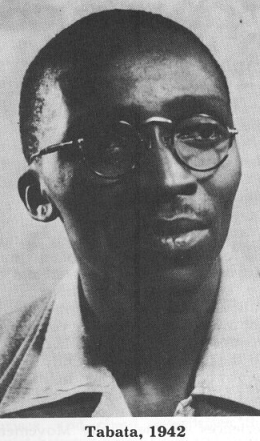
ISR Index | Main Newspaper Index
Encyclopedia of Trotskyism | Marxists’ Internet Archive
From International Socialist Review, Vol.26 No.3, Summer 1965, p.84.
Transcribed & marked up by Einde O’Callaghan for ETOL.
 |
I.B. Tabata, the President of the Unity Movement of South Africa, has devoted a lifetime to the struggle for liberation. In the early thirties, he joined the African Voter’s Association, which was fighting for extention of the vote to all Africans over the age of twenty-one.
At that time, no nonwhite could sit in Parliament, but Africans and Coloreds had a limited franchise in the Cape Province. However, with the so-called Native Representation Act of 1936, Africans – who comprise nearly three-quarters of the population – were deprived of the last vestige of political rights.
Faced with the crisis of the proposed bill, Africans came together from all over the country to protest this attack and to form the All-African Convention, capable of welding the whole African population into a single unit. However, certain African leaders with a long attachment to liberals did not realize the necessity of severing all ties with white parties and launching an independent struggle.
For more than a decade they were caught up in actually operating the bogus Native Representation Act, occupying seats on a purely advisory Native Representation Council and urging the African people to take part in the dummy elections of three white “Native Representatives” to speak for nearly three-quarters of the population in a parliament of 750 representing the whites!
The formation of the Non-European Unity Movement (now the Unity Movement) during the Second World War marked a turning point in this struggle. The Unity Movement had a program for full democratic rights for all irrespective of race, a revolutionary demand in the political conditions of South Africa. From this program followed the policy of non-collaboration with the oppressors, meaning the complete rejection of the myth of inferiority and refusal to operate the segregated governmental institutions for a “child race.”
Throughout the forties and early fifties, Tabata played an important part in the resistance which the All-African Convention was helping the peasants to organize against the “Rehabilitation Schemes,” designed to deprive them still further of land and cattle.
As the fascist Nationalist Government in the fifties and still more since 1960, the year of the Pondoland revolt and the Sharpeville massacre, has mounted a ferocious attack on the Africans in the “Reserves,” their spirit of resistance has deepened: Peasant Committees send leaders from Northern Transvaal and Zululand in Natal to the Transkei in the Cape Province, because they have learned that united struggle under a correct program is the first necessity in the long, grim struggle that lies before them.
In 1955, the Nationalist Government placed Tabata under a five-year ban and confined him to the city of Cape Town. On the midnight that it ended, in the critical year 1960, he resumed his organizational work throughout South Africa under conditions of heightened government repressions and police activity, both in the towns and still more in the “Native Reserves.”
A mixture of audacity and luck enabled him to escape continual police pursuit. But by May, 1963, he was advised that he should make his escape, since under the 90-Day Detention Act arrest was imminent. The police-van sat outside his door, but he escaped through Natal to Swaziland, a British Protectorate inside South Africa.
In 1961, in face of mounting political tensions, with the government applying both bribery and force to spread confusion among non-white leaders of various groups, the leadership of the Unity Movement established a national political organization, APDUSA, The African People’s Democratic Union of Southern Africa, and made Tabata its president.
APDUSA was born in secret on the mountainside, but its influence has spread quickly among African, Colored and Indian workers and intellectuals in the towns, chiefly of the Cape Province and Natal. Many peasant committees in the Transkei, in Zululand and the Northern Transvaal have become affiliated to it.
Today, Tabata has found refuge in Lusaka, Zambia.
ISR Index | Main Newspaper Index
Encyclopedia of Trotskyism | Marxists’ Internet Archive
Last updated on 25 June 2009